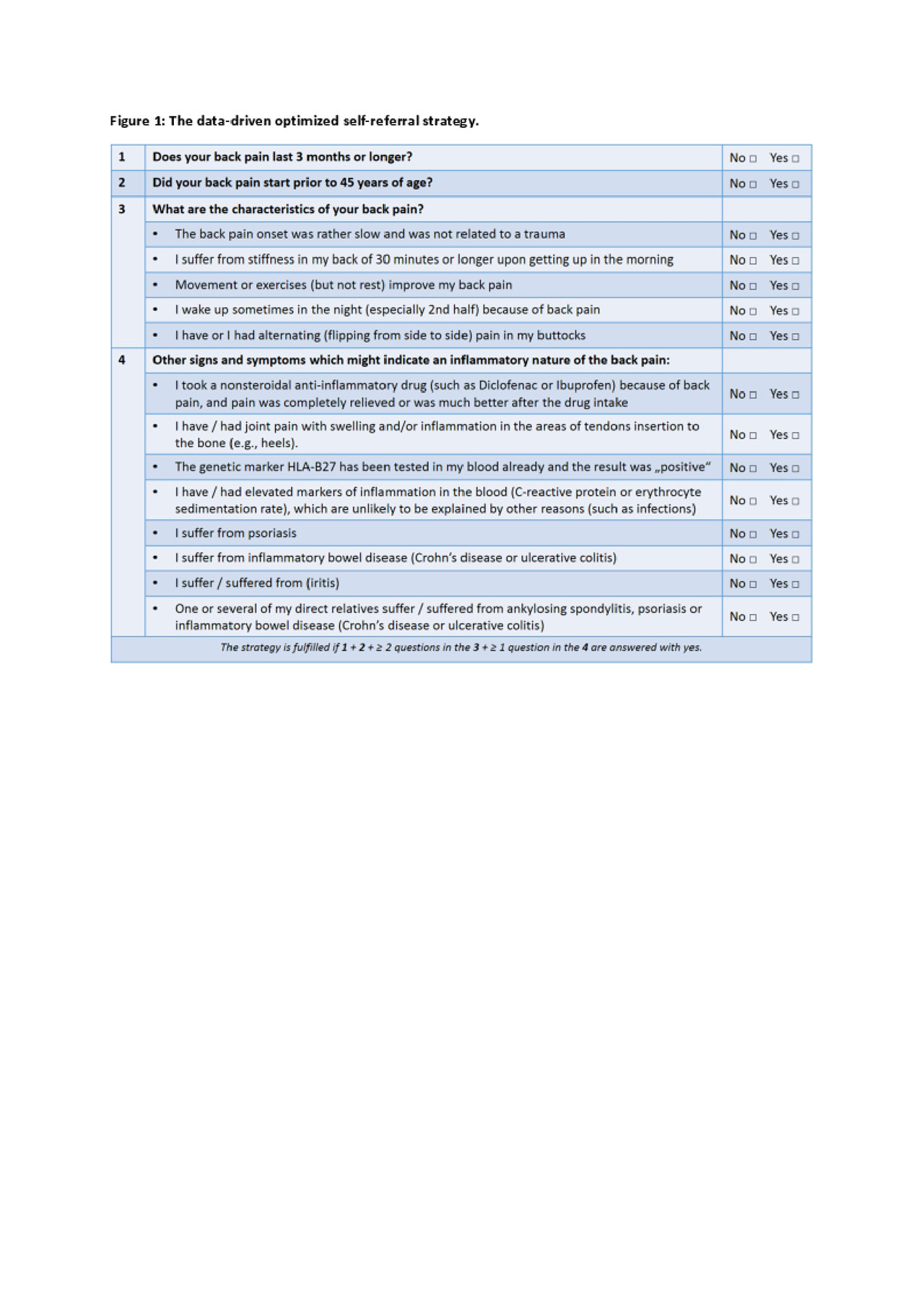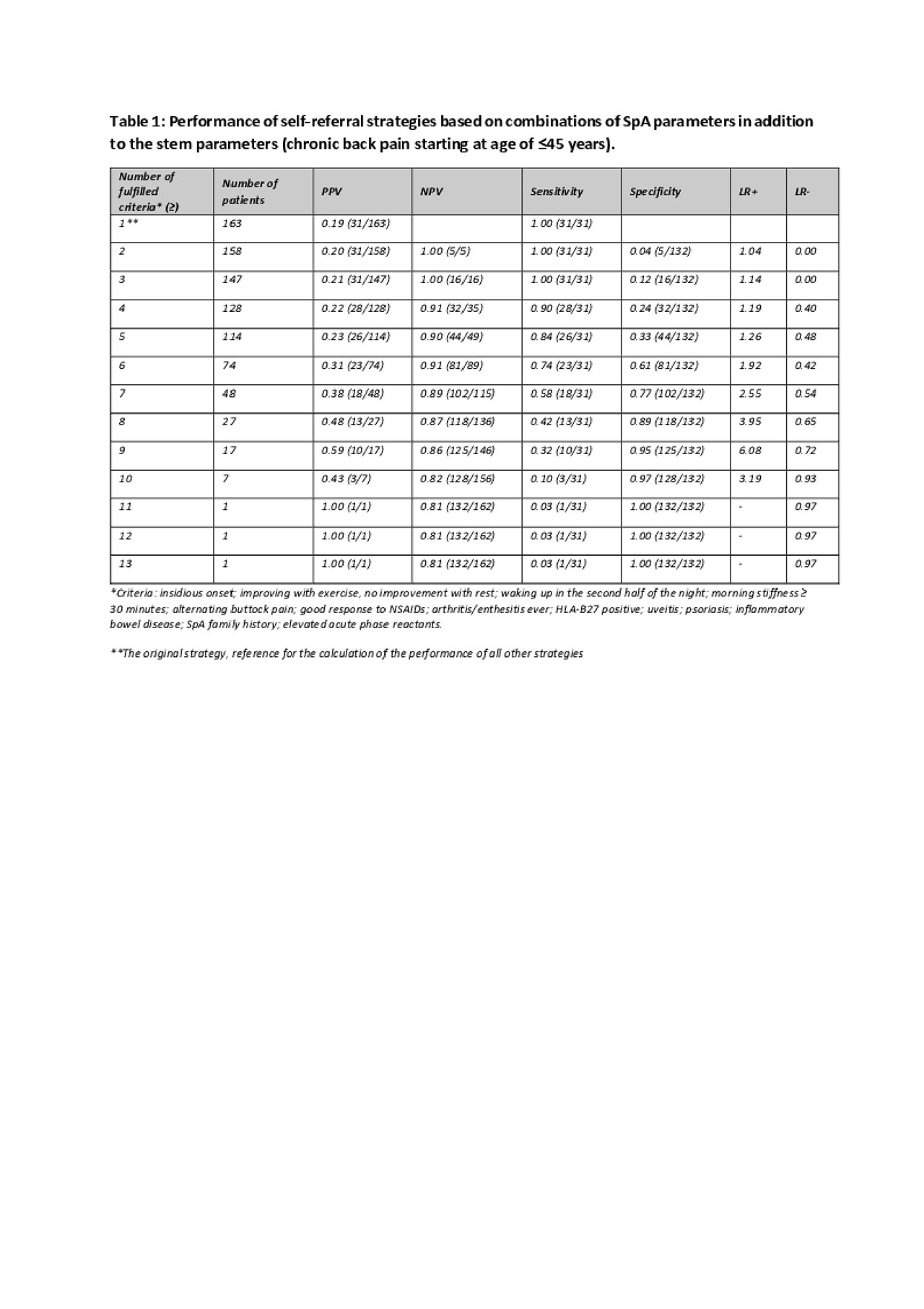Session Information
Session Type: Poster Session (Sunday)
Session Time: 9:00AM-11:00AM
Background/Purpose: One of the major reasons for a long diagnostic delay in axial spondyloarthritis (axSpA) is the late referral of patients by primary care physicians dealing with patients with chronic back pain. We developed and implemented an online self-referral tool (www.bechterew-check.de), which gave access to a rheumatological consultation if patients declared suffering from chronic back pain (≥ 3 months) with a symptom onset ≤ 45 years of age, and at least one feature indicative of SpA. In the prospective “Identification of the Optimal Referral Strategy for Early Diagnosis of Axial Spondyloarthritis (OptiRef) Study” we could diagnose axSpA in 19% of the self-referred patients. The objective was to optimize the online-self-referral tool for recognition of patients with high suspicion of axSpA in order to increase the specificity by keeping the high level of sensitivity.
Methods: 181 patients who had fulfilled the online self-referral strategy were included and underwent a standardized rheumatology examination. The final diagnosis of axial SpA / no axial SpA by the rheumatologist served as the gold standard. The performance of all possible combinations of the referral parameters (13 parameters in total including 5 features of inflammatory back pain (IBP) and 8 other SpA features) added to both stem parameters (chronic back pain starting at age of ≤45 years) was tested. In addition, the following pre-specified combinations were evaluated: 1) ≥1 IBP parameter AND ≥1 other SpA parameter, 2) ≥1 IBP parameter OR ≥1 other SpA parameter. For all combinations, a sensitivity, a specificity, positive and negative predictive values (PPV and NPV), as well as a positive and negative likelihood ratio (LR+ and LR-) were calculated. We targeted the maximal specificity by acceptable sensitivity (defined as ≥90% of the original strategy).
Results: For 163 of the included patients, full data of the online questionnaire as well as of rheumatology examination including the final diagnosis was available. 31 (19%) of them were diagnosed with axial SpA. Raising the threshold of the number of positive parameters (table 1) resulted in a quick drop of the sensitivity. According to the pre-defined selection criterion, only a strategy with any four positive parameters would be acceptable. An analysis of combined strategies (IBP parameters and/or other SpA parameters) resulted into identification of a strategy with an improved performance: a combination of ≥2 IBP parameters with ≥1 other SpA parameters (in addition to both stem parameters) showed a sensitivity of 90% (28/31), a specificity of 27% (35/132), a PPV of 22% (28/125), a NPV of 92% (35/38), LR+ of 1.23 and LR- of 0.36. Thus, identifying 28 of 31 patients with axSpA would have been possible after the assessment of 125 patients instead of 163.
Conclusion: The data-driven optimized online self-referral tool (figure 1) requires the following parameters to be positive: chronic back pain (≥3 months) plus back pain onset before 45 years of age plus ≥2 IBP parameters plus ≥1 other SpA feature. The performance of this tool should be confirmed in a prospective study.
To cite this abstract in AMA style:
Proft F, Spiller L, Protopopov M, Rios Rodriguez V, Muche B, Rademacher J, Lüders S, Weber A, Redeker I, Poddubnyy D. Development of an Optimized Online Self-Referral Tool for Early Recognition of Patients with Axial Spondyloarthritis – Data from the OptiRef Study [abstract]. Arthritis Rheumatol. 2019; 71 (suppl 10). https://acrabstracts.org/abstract/development-of-an-optimized-online-self-referral-tool-for-early-recognition-of-patients-with-axial-spondyloarthritis-data-from-the-optiref-study/. Accessed .« Back to 2019 ACR/ARP Annual Meeting
ACR Meeting Abstracts - https://acrabstracts.org/abstract/development-of-an-optimized-online-self-referral-tool-for-early-recognition-of-patients-with-axial-spondyloarthritis-data-from-the-optiref-study/


